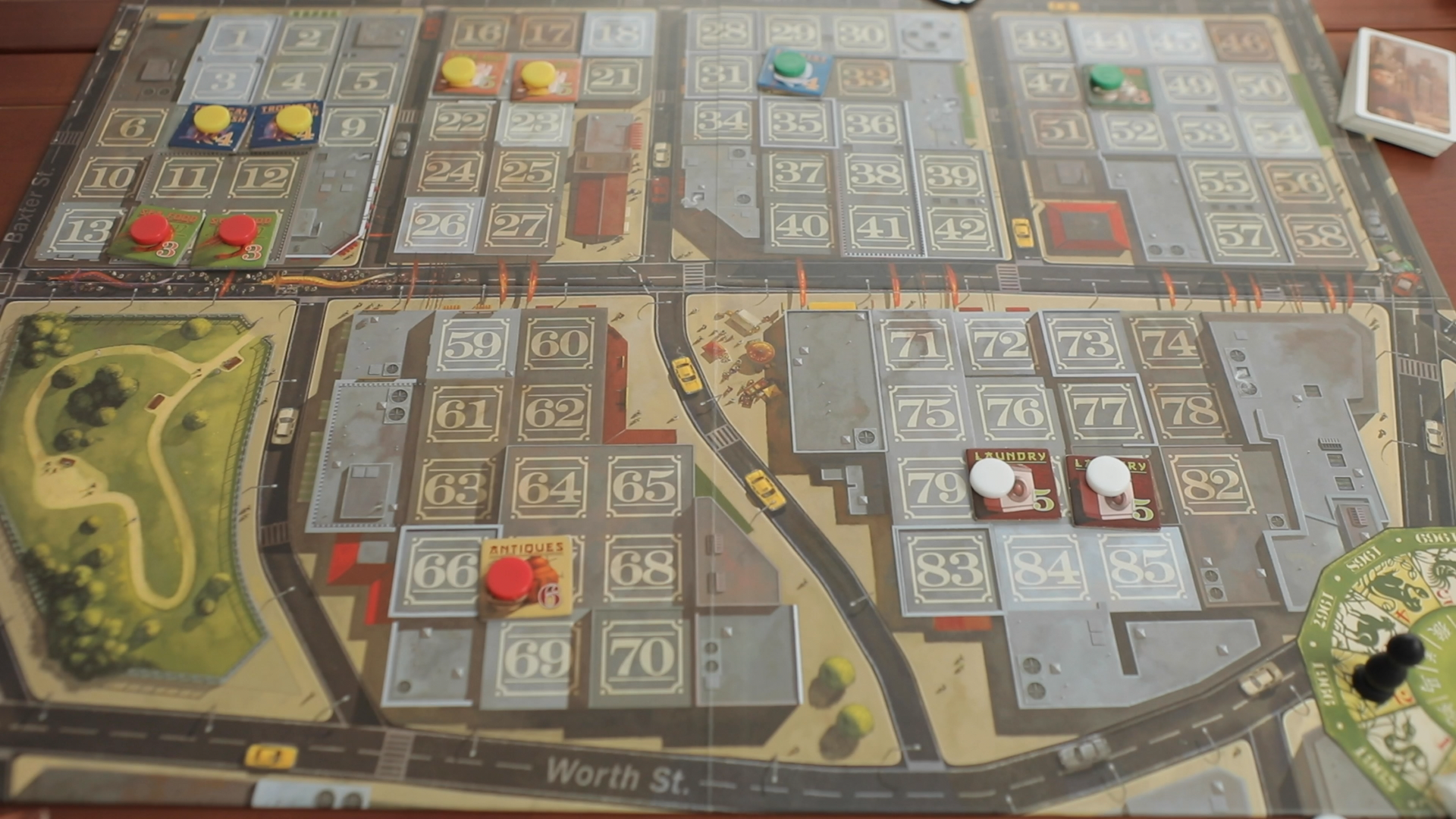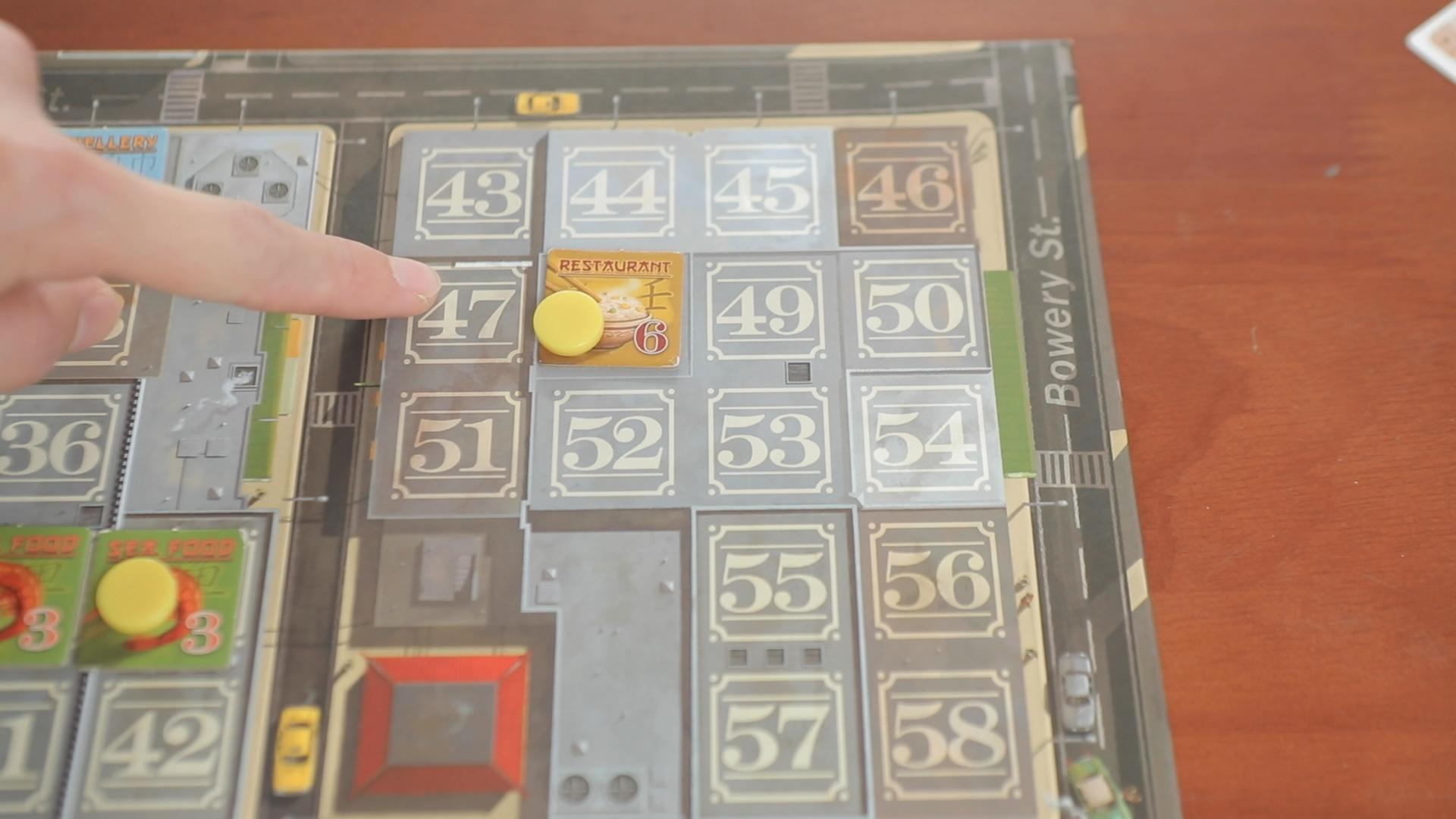Chinatown Review
A pure trading frenzy that is so social, it can sometimes feel like a complex party game.
Elevate your Chinatown businesses in trading with other businessmen players in about an hour. A strict upgrade from any trading in Monopoly. 3-5 players.
Video published November 13th, 2020

Chinatown, New York. 1965. Ripe for business development.

No one has precisely what they need, so trade away.

Expand varied types of businesses to really rake in the cash.
Overview & How to Play
You are a businessman in Chinatown, hoping to become a millionaire! But you won’t have all the pieces to make your businesses the best they can be, so you gotta start trading. And trading. And trading.
The goal is to have the most money when the game ends. In each of the 6 rounds, players will receive 2 resources: tiles, and lots. Lots are numbers displaying where you're allowed to place businesses on the board, and the tiles represent the actual businesses. Businesses will be called Laundry, Dim Sum, Seafood, Antiques, etc, but their name isn’t important, rather the number on them is.
That number, ranging from 3-6, shows the maximum size you can make that business, that is, if you own that many tiles of that SAME business touching on the board. If you get that maximum size, you complete a set, which means they generate much more income than normal. In addition, the closer and closer an incomplete set gets to becoming a complete set, the more and more money it makes.
You won’t always have everything you need to finish your business chains, but good news! You’re gonna have something that someone else wants, and maybe they have something you want. So once everyone has drawn their business lots and tiles for the round, its trading time! You can trade cash, business tiles, business lots—really anything you want with whoever—with no restrictions. Just note that everyone’s total cash quantities are secret. Once everyone is done trading, they can place their business tiles on any lots they own and get money from their placed businesses before moving to the next round. After the 6th round, you count your cash, whoever has the most wins.
Pros
Chinatown just looks incredibly Chinatown New York-y, with businesses just CRAMMED together in 6 districts. When you’re actually playing, the nice colors and pieces translate to ownership never being confusing. The game even comes with a soft, velvet-y bag for the pieces which is very much appreciated. Tiles look hilariously bootleg but distinguishable, and money is like normal dollar bills, multiplied by a thousand. So George Washington becomes a 1,000 dollar bill.
So when playing Chinatown, we have to stress how it’s incredibly easy to learn. All you do on a turn is draw cards, discard some, draw tiles, trade, and then place your businesses on the board. That’s it, no convoluted phases or rules in its straightforward rulebook.
Chinatown does a fantastic job of encouraging trading. It’s definitely one of those social games where you HAVE to trade to win since completing sets is paramount for big income gains. Then when you factor in that players get less resources as the game goes on, you’ll have to start pestering your friends for deals. And remember, this is Chinatown, and the real estate on the board feels real crowded. This is great, as many business lots will be surrounded by tons of other lots, making it very likely that someone will have something that you need for those adjacency bonuses.
What’s really key to Chinatown is that there’s NO restrictions on trading, so make some offers and start dealing. This freeform gameplay lends itself into a variety of strategies. First, you can just go really ballsy early, and trade all of your resources on one type of tile, trying to get that bonus of 140,000 for completing 6 tiles. Or maybe you don’t care much about owning multiple businesses, and instead just focus on selling your resources every turn for cash. Remember, your businesses don’t account for any money themselves at the end of the game, it’s cash that’s king.
But wait, there’s even more options on how you want to do trading! You can make multiplayer deals, acting as a mediator between two parties to try to get profit, or just open up an auction for your stuff! How about just jumping in front of someone’s face as soon as the trading begins, so that they won’t see any other options? Physicality matters here.
All the trading is happening in this loud and crazy marketplace where you might have to run to the other side of the table to make an intricate deal, and timing is always a big factor because once the trading phase begins, all the deal offers start flowing at once. You snooze, you lose.
Trading tendencies change as the game gets closer to the end of the 6 rounds, and trading can be a bit of a gamble early because no one really knows what tiles they’ll draw in future rounds, adding some unpredictability to the business.
Nitpicks
But a couple of warnings here: don’t play with 3 players, it doesn’t lead to good deals, where if you’re trading with someone else… well person 3 is just blocked out of trading with anyone. Plus, there are times where you can immediately calculate how much money someone will make by the game end, which hampers trading.













